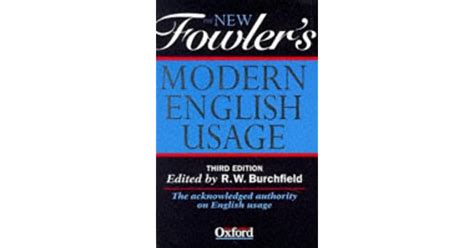A Quote by Henry Watson Fowler
Quotation... A writer expresses himself in words that have been used before because they give his meaning better than he can give it himself, or because they are beautiful or witty, or because he expects them to touch a cord of association in his reader, or because he wishes to show that he is learned and well read. Quotations due to the last motive are invariably ill-advised; the discerning reader detects it and is contemptuous; the undiscerning is perhaps impressed, but even then is at the same time repelled, pretentious quotations being the surest road to tedium.
Quote Topics
Advised
Association
Beautiful
Because
Been
Before
Being
Better
Contemptuous
Cord
Discerning
Due
Even
Expects
Expresses
Give
Himself
His
Ill
Impressed
Invariably
Last
Learned
Meaning
Motive
Perhaps
Pretentious
Quotation
Quotations
Read
Reader
Road
Same
Same Time
Show
Tedium
Than
Them
Then
Time
Touch
Used
Well
Wishes
Witty
Words
Writer
Related Quotes
I think the effective use of quotation is an important point in the art of writing. Given sparingly, quotations serve admirably as a climax or as a corroboration, but when they are long and frequent, they seriously weaken the effect of a book. We lose sight of the writer - he scatters our sympathy among others than himself - and the ideas which he himself advances are not knit together with our impression of his personality.
The writer's job, after all, is not to dictate meaning, but to give the reader enough pieces to create his or her own satisfying meaning. The story is truly finished—and meaning is made—not when the author adds the last period, but when the reader enters the story and fills that little ambiguous space, completing the circuit, letting the power flow through.
Every reader, as he reads, is actually the reader of himself. The writer's work is only a kind of optical instrument he provides the reader so he can discern what he might never have seen in himself without this book. The reader's recognition in himself of what the book says is the proof of the book's truth.
It is easier for the reader to judge, by a thousand times, than for the writer to invent. The writer must summon his Idea out of nowhere, and his characters out of nothing, and catch words as they fly, and nail them to the page. The reader has something to go by and somewhere to start from, given to him freely and with great generosity by the writer. And still the reader feels free to find fault.
He who is gracious to his lover under the impression that he is rich, and is disappointed of his gains because he turns out to be poor, is disgraced all the same: for he has done his best to show that he would give himself up to any one's "uses base" for the sake of money; but this is not honourable.
[Harvey] Weinstein appointed himself as the arbiter of your family safety. When was the last time his life was in danger, probably choking on a veal chop. He doesn't need a gun because he has security. He travels in rarified air. His feet never touch the street - feet, mind you, that he can't see because he's a corpulent cretin.
The analytical writer observes the reader as he is; accordingly, he makes his calculation, sets his machine to make the appropriate effect on him. The synthetic writer constructs and creates his own reader; he does not imagine him as resting and dead, but lively and advancing toward him. He makes that which he had invented gradually take shape before the reader's eyes, or he tempts him to do the inventing for himself. He does not want to make a particular effect on him, but rather enters into a solemn relationship of innermost symphilosophy or sympoetry.
But what will he do when he sees only too clearly why his patient is ill; when he sees that it arises from his having no love, but only sexuality; no faith, because he is afraid to grope in the dark; no hope, because he is disillusioned by the world and by life; and no understanding, because he has failed to read the meaning of his own existence?
With a 660-page book, you don't read every sentence aloud. I am terrified for the poor guy doing the audio book. But I do because I think we hear them aloud even if it's not an audio book. The other goofy thing I do is I examine the shape of the words but not the words themselves. Then I ask myself, "Does it look like what it is?" If it's a sequence where I want to grab the reader and not let the reader go then it needs to look dense. But at times I want the reader to focus on a certain word or a certain image and pause there.




































